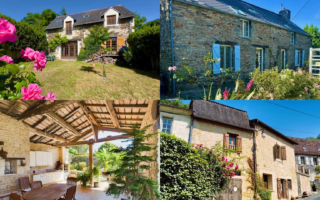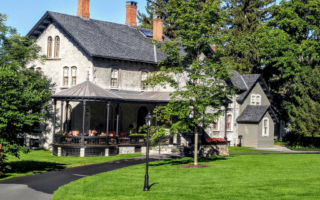Buying in France: An Overview of the Process


An overview of the French property buying process and how it differs from the UK, by Karen Tait…
While there are plenty of similarities between the process of buying a property in France or in England and Wales (Scotland has a different system again), there are some key differences too; the main ones being the contract becomes binding earlier on in the process in France, shortly after an offer has been accepted (whereas in England and Wales the deal is sealed towards the end of the process, making it easy to be gazumped). Also, a state-employed notaire is required to be involved in any French property or land transaction. More of that later, first let’s take a look at the steps you will take towards owning a property in France.
THE PROPERTY BUYING PROCESS
- VIEWINGS:
The agent will accompany you on viewings and may ask you to sign a bon de visite; this just proves that you were introduced to the property by that agent and prevents you, for example, going direct to the seller and cutting out the agent. If the agency has an exclusive mandate, only they will be marketing that property. Otherwise, there could be two or even several agencies marketing a property, and often at different prices. Properties are also sold privately in France and also some notaires sell properties alongside their legal role.
- MAKING AN OFFER:
As in the UK, you could make an offer during the viewing or, as is more common, following the viewing, and via the agent. Technically, under French law, if you make an offer which is accepted by the seller, in principle a contract has been made, binding both parties. In practice, this is very rarely the case, and an accepted offer is followed by a written contract.
- SIGNING THE CONTRACT:
The preliminary contract is usually called the compromis de vente (but may be a promesse de vente or promesse d’achat). A standard compromis is sometimes used by agents, but it is better all round for it to be drafted by a notaire. It contains the terms and conditions of the sale, including the purchase price and timeline, along with details about the property, and the buyer/s and seller/s.
- CONDITIONAL CLAUSES:
The contract can also include conditions suspensives. These could be, for example, that the sale is dependent on a successful survey or getting planning permission for works the buyer wants to make to the property. These clauses have to be agreed by the seller. If the buyer needs finance or a mortgage to buy the property, this must be included in the compromis. If any of the clauses are not met, the buyer can pull out without penalty. Both buyer and seller must sign the compromis. Nowadays, this can be done electronically, you don’t have to go to the notaire’s office in France to sign.
- DEPOSIT:
At this time a deposit is usually paid by the seller, typically 10% of the sale price, and held by the notaire (or sometimes by the agent, in a client account). However, a deposit is not legally required and in some cases the sale goes ahead without one, for example, if the buyer is paying for the property with a 100% loan or mortgage.
- COOLING-OFF PERIOD:
After the compromis de vente is signed, the buyer – but not the seller – has a 10-day cooling- off period, during which time they can retract their offer for any reason. After this, the sale is binding for both buyer and seller. If the buyer pulls out, the seller loses their deposit. If the seller pulls out, they must pay back the deposit plus the same amount in compensation.
- CONVEYANCING:
There’s a period of around three to four months between the signing of the first contract and the signing of the final contract, the acte de vente. During this time, the notaire carries out the various searches and checks on the property and the parties involved, to verify the property’s title and ownership.
- DIAGNOSTICS AND SURVEYS:
By law, the vendor has to provide (and pay for) a series of diagnostic checks (DDT), covering energy efficiency (DPE); wastewater drainage; termites, fungal and insect larvae related damage; asbestos; lead; gas and electrical installations; natural risks; and surface area for apartments (not houses). These do not replace a structural survey, which is not legally required. For peace of mind and technical information about the property, however, it may be advisable for the buyer to pay for a survey too.
- COMPLETION:
Once the notaire is satisfied everything is above board, both parties sign the final contract, the acte de vente. This can be done in person in the notaire’s office or by using power of attorney if you are unable to attend. The notaire will later send on an attestation de vente showing the new ownership.
- PAYMENT AND FEES:
The full amount of the sale price is transferred to the seller, minus any fees or taxes to be paid. Notaire’s fees are on a sliding scale of 7-10% of the sale price (3% for a new property) and include registration fees or taxes. They are paid by the buyer. Agency fees are set by the agency and are typically 5-10% of the sale price, paid by the seller (although they’re generally included in the advertised sale price, frais inclus).
- INSURANCE:
It is a legal requirement in France to have home insurance (assurance habitation), and notaires will often ask for proof of it at completion. You can take over the previous owner’s insurance or take out your own.
INHERITANCE ISSUES
Another key difference between France and the UK is that under French law, a forced heirship system applies. This means, it’s not easy to leave your French property to whoever you wish, for example, bequeathing it to the local cats’ home instead of your offspring. Under EU regulations, it is now possible to include a provision in your UK will allocating your national law (i.e. UK) to your worldwide estate, including your French property. However, it is still advisable to draft both a UK and a French will to avoid any complications. So inheritance, and estate planning, is something you should consider early on in the process. This is especially important as how you buy your French property – the ownership structure – will have an influence on how you can bequeath it.
Your marital status will be a key consideration. In addition to inheritance, it will affect the tax your beneficiaries will pay. For example, the French inheritance tax rate between spouses (and PACS civil partners) is nil while non- married couples are, in effect, taxed as strangers at 60%. (Tax varies hugely between beneficiaries so it’s clearly important to consider it in advance; for example, children have a €100,000 tax-free allowance, while stepchildren face a 60% tax bill.)
While in the UK there is only one marital regime, France has three: séparation des biens (you each own only the assets held in your own name), communauté réduite aux acquêts (default marriage regime in France, everything purchased by the spouses after the marriage is owned jointly) and communauté universelle (all assets, from before and during the marriage, is owned jointly). So for couples buying a French property, it is important to understand which marital regime the purchase will come under. You can also choose to buy your French property using a ‘tontine’ clause or via a ‘Societie Civile Immobilière’.
The unique mix of legal, financial and tax advice along with in-depth location guides, inspiring real life stories, the best properties on the market, entertaining regular pages and the latest property news and market reports makes French Property News magazine a must-buy publication for anyone serious about buying and owning a property in France.
Lead photo credit : © Shutterstcok
Share to: Facebook Twitter LinkedIn Email
More in Buying in France, buying property



